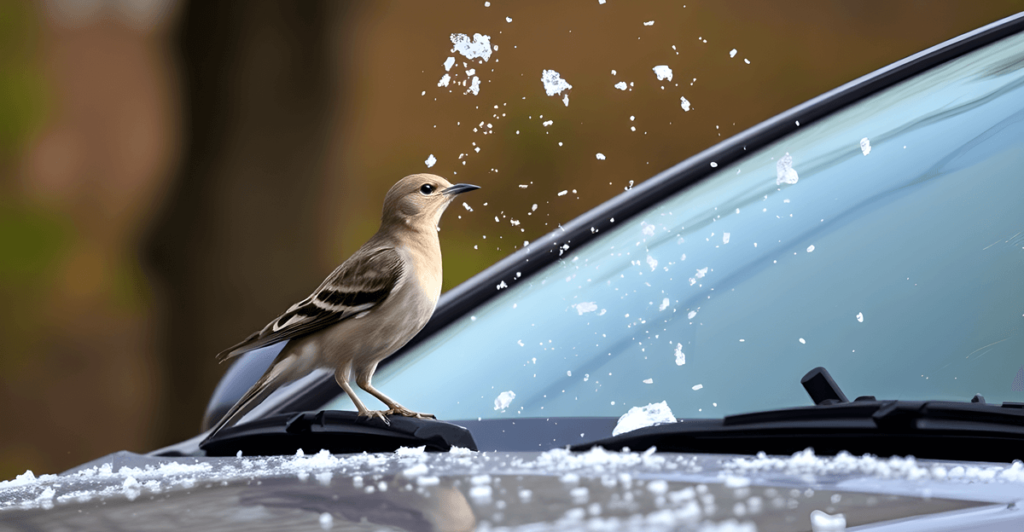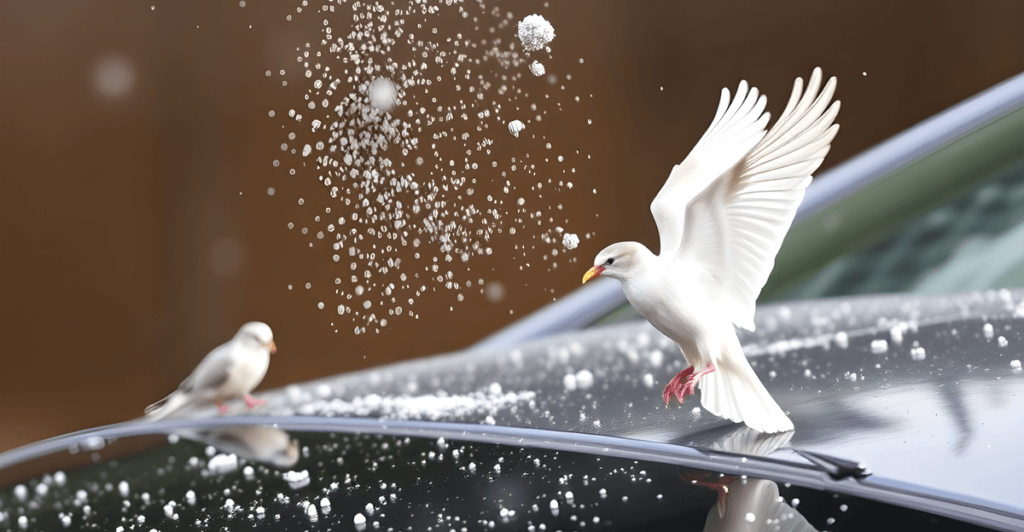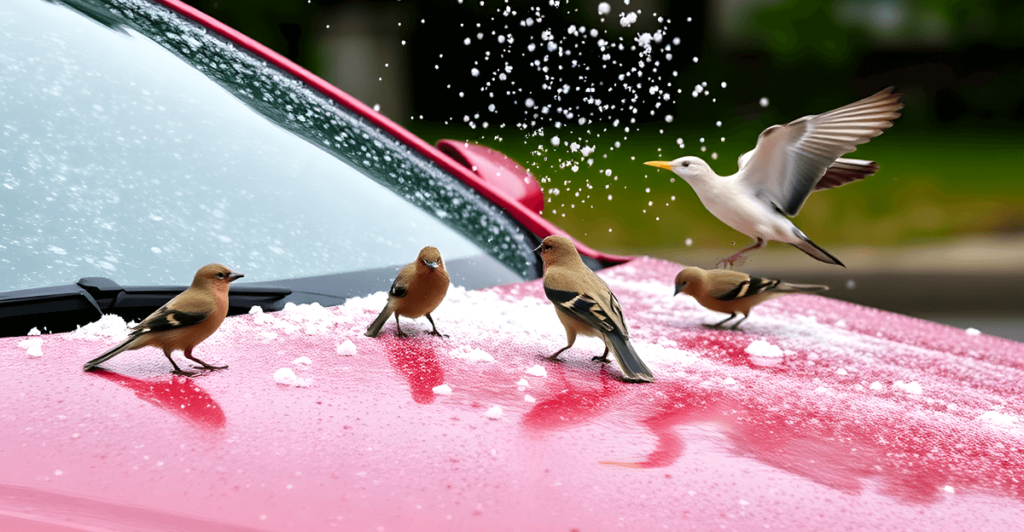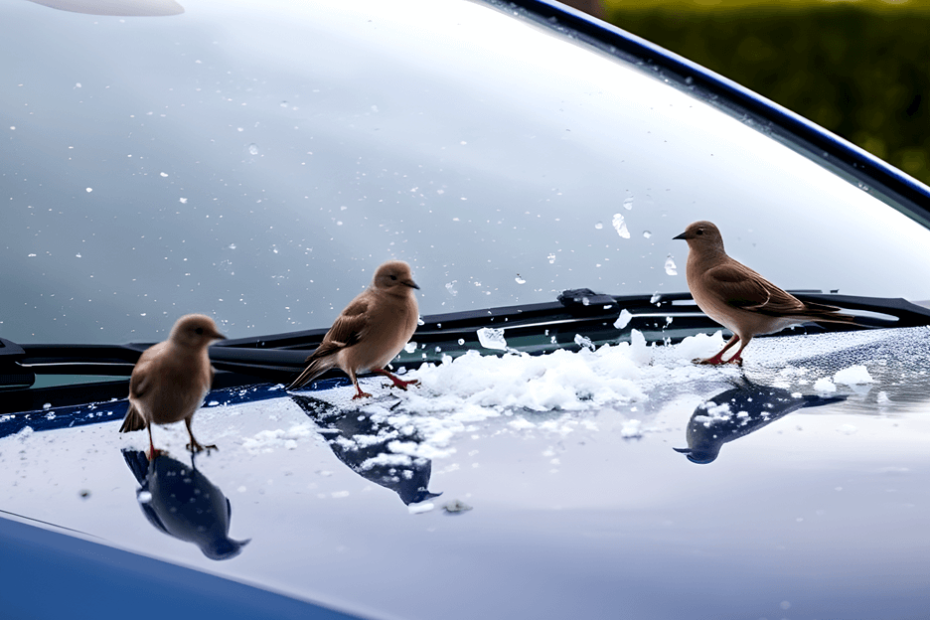Introduction
As someone who has struggled with persistent bird droppings on my car for years, I’ve learned a thing or two about keeping these feathered fiends at bay. In this comprehensive guide, I’ll share my hard-earned knowledge and personal experiences to help you protect your vehicle from becoming a avian toilet. From understanding bird behavior to implementing effective prevention methods, we’ll cover everything you need to know about how to stop birds from pooping on your car.
Picture this: You’ve just spent hours washing and waxing your car to perfection, only to find it covered in bird droppings the next morning. It’s a frustrating experience that I’ve faced countless times, and I’m sure many of you can relate. Bird droppings on cars are more than just an unsightly nuisance; they can cause serious damage to your vehicle’s paint and finish if left unattended.
In my quest to solve this problem, I’ve tried numerous methods, consulted experts, and even conducted my own experiments. This article is the culmination of that journey, offering you a comprehensive guide on how to keep your car poop-free and looking its best.
II. Understanding Bird Behavior
To effectively combat the problem of birds pooping on your car, it’s crucial to understand why they do it in the first place. Through my research and observations, I’ve gained valuable insights into bird behavior that have helped me develop more effective prevention strategies.
How To Stop Birds From Pooping On My Car?
Contrary to popular belief, birds don’t intentionally target cars out of spite or mischief. The reality is much simpler:
- Convenient perches: Birds often use elevated surfaces like tree branches, power lines, or even your car’s side mirrors as perches. When nature calls, they simply let loose.
- Reflective surfaces: The shiny, reflective surface of a car can be attractive to birds, especially during mating season when they might mistake their reflection for a rival.
- Territorial marking: Some birds use their droppings to mark their territory, and your car might just be in the wrong place at the wrong time.
- Digestive habits: Birds have a fast metabolism and don’t have a separate urinary tract, which means they excrete waste frequently and often while in flight.
Common bird species that are frequent culprits
In my experience, certain bird species are more likely to leave their mark on your car than others. Here’s a table of common culprits I’ve encountered:
| Bird Species | Likelihood of Pooping on Cars | Typical Habitat |
|---|---|---|
| Pigeons | Very High | Urban areas, parks |
| Seagulls | High | Coastal regions, parking lots |
| Starlings | Medium | Urban and suburban areas |
| Crows | Medium | Varied habitats |
| Sparrows | Low to Medium | Widespread |
Factors that attract birds to vehicles
Through my observations, I’ve noticed several factors that seem to make certain cars more attractive to birds:
- Color: Surprisingly, red cars seem to be targeted more often. I once owned a red sedan that was constantly bombarded, while my neighbor’s white car remained relatively unscathed.
- Location: Cars parked under trees or near buildings with ledges are prime targets.
- Cleanliness: Ironically, a clean, shiny car can attract more birds due to its reflective surface.
- Time of day: Early morning and late afternoon seem to be peak pooping times, coinciding with birds’ active periods.
Understanding these factors has helped me make smarter choices about where and when I park my car, significantly reducing the frequency of bird droppings.

III. The Impact of Bird Droppings on Your Car
When I first started dealing with this issue, I underestimated the potential damage bird droppings could cause. However, after experiencing the consequences firsthand, I quickly learned the importance of prompt action.
Potential damage to paint and finish
Bird droppings are not just unsightly; they can cause serious and permanent damage to your car’s paint and finish. Here’s what I’ve learned about the potential impacts:
- Etching: Bird droppings are highly acidic, with a pH level that can be as low as 3.5. This acidity can eat through your car’s clear coat and even etch the paint beneath if left for too long.
- Staining: The pigments in bird droppings can leave permanent stains on light-colored cars. I once left a dropping on my white car for just a few hours on a hot day, and it left a faint yellowish mark that took professional detailing to remove.
- Paint oxidation: The chemicals in bird droppings can accelerate the oxidation process of your car’s paint, leading to a dull, faded appearance over time.
- Clear coat damage: Repeated exposure to bird droppings can weaken your car’s clear coat, making it more susceptible to other forms of damage like scratches and UV radiation.
Health concerns related to bird droppings
Beyond the cosmetic issues, bird droppings can also pose health risks. While researching this topic, I was surprised to learn about the potential dangers:
- Diseases: Bird droppings can carry over 60 transmittable diseases, including salmonella and E. coli.
- Respiratory issues: Dried bird droppings can become airborne and, when inhaled, may cause respiratory problems, especially in individuals with compromised immune systems.
- Fungal infections: Some bird droppings contain fungi that can cause infections in humans if they come into contact with open wounds or are inhaled.
Frequency of cleaning required
Based on my experience, the frequency of cleaning required depends on several factors:
- Parking location: If you park in a bird-heavy area, daily cleaning may be necessary.
- Season: Spring and summer typically require more frequent cleaning due to increased bird activity.
- Weather conditions: Hot, sunny weather can bake droppings onto your car, making them harder to remove and potentially causing faster damage.
Personal anecdote: When I lived near a park, I found myself cleaning bird droppings off my car almost daily during the summer months. It was a constant battle that ultimately led me to invest in more robust prevention methods.
IV. Prevention Methods: How to Keep Birds from Pooping on Your Car
After years of trial and error, I’ve found that a multi-faceted approach works best for preventing bird droppings on cars. Here are the methods I’ve personally tested and found effective:
A. Physical barriers
- Car covers: This has been my go-to solution for long-term parking. I use a breathable, water-resistant cover that protects against both bird droppings and other environmental factors. Pros:
- Provides complete coverage
- Protects against other elements (sun, rain, dust) Cons:
- Can be cumbersome to put on and take off daily
- May trap moisture if not properly ventilated
- Tarps: A quick and cheap solution for short-term protection. I keep a lightweight tarp in my trunk for unexpected parking situations.
- Portable garages or carports: If you have the space, a portable garage or carport can provide excellent protection. I invested in one for my driveway, and it’s been a game-changer.
B. Visual deterrents
- Reflective objects: Hanging reflective objects near your parking spot can deter birds. I’ve had success with reflective bird diverters, which are inexpensive and easy to install.
- Fake predators: Owl decoys or hawk silhouettes can be effective, but in my experience, they need to be moved regularly to remain convincing.
- Hanging CDs or DVDs: An old trick that still works. The reflective surface and movement in the wind can keep birds away. I’ve strung old CDs along my carport with good results.
C. Sound-based solutions
- Ultrasonic bird repellers: These devices emit high-frequency sounds that birds find unpleasant. I’ve used one with moderate success, though its effectiveness can vary depending on the bird species.
- Wind chimes: The unpredictable sound of wind chimes can make birds uncomfortable. I hung a set near my parking spot and noticed a decrease in bird activity.
- Predator sound devices: These play recordings of predator birds or distress calls. While effective, I found them a bit disruptive for residential use.
D. Scent-based deterrents
- Essential oils: Birds dislike certain strong scents. I’ve experimented with peppermint and citrus oils diluted in water and sprayed around my parking area.
- Commercial bird repellent sprays: There are many products on the market designed to repel birds. I’ve had mixed results with these, but some can be quite effective.
E. Alternative parking strategies
- Choosing covered parking spots: Whenever possible, I opt for covered parking in public areas.
- Avoiding trees and power lines: I’ve learned to be strategic about where I park, avoiding areas directly under trees or power lines where birds frequently perch.
- Rotating parking locations: If you have multiple parking options, rotating between them can prevent birds from establishing a routine.
Case study: My neighbor’s experience
My neighbor, John, was at his wit’s end with bird droppings on his new sports car. After trying various methods, he found success with a combination approach:
- He installed a retractable carport for home parking.
- He hung reflective bird diverters around the carport.
- For public parking, he used a high-quality car cover and chose spots away from trees when possible.
Within a month, John reported a 90% reduction in bird droppings on his car.

V. Cleaning and Protecting Your Car from Bird Droppings
Despite our best prevention efforts, occasional bird droppings are inevitable. Here’s what I’ve learned about effectively cleaning and protecting your car:
A. Quick response techniques
The key to minimizing damage is to act fast. I always keep an emergency cleaning kit in my car, which includes:
- Microfiber cloths
- A spray bottle filled with water
- Car-safe cleaning wipes
- A small bottle of quick detailer spray
Important: Never wipe a dry dropping, as this can scratch your paint. Always wet the area first.
B. Safe cleaning methods
- Soak the dropping with water or a car-safe cleaner.
- Let it sit for a minute to soften.
- Gently remove the bulk of the dropping with a damp microfiber cloth.
- Clean the area thoroughly with car soap and water.
- Dry and inspect the area for any remaining residue or damage.
For stubborn droppings, I’ve found that using a clay bar can help remove any etched-in contaminants.
C. Protective coatings and waxes
Applying a protective coating to your car can make cleaning easier and provide an extra layer of defense against bird droppings. In my experience, these options work well:
- Ceramic coatings: Offer long-lasting protection but require professional application.
- Synthetic sealants: Provide good protection and are easier to apply at home.
- Carnauba wax: Offers a deep shine and decent protection, but requires more frequent application.
I personally use a combination of a ceramic coating (applied professionally once a year) and regular applications of carnauba wax for added protection and shine.
VI. Natural and Eco-Friendly Solutions to Prevent Bird Pooping
As an environmentally conscious car owner, I’ve also explored natural and eco-friendly solutions to this problem. Here are some methods I’ve found effective:
A. Creating bird-friendly areas away from your car
- Install bird feeders and baths: By providing alternative food and water sources away from your parking area, you can redirect bird activity. I set up a small bird sanctuary in the far corner of my yard, which has noticeably reduced bird traffic near my driveway.
- Plant bird-friendly vegetation: Certain plants can attract birds away from your car. I’ve had success with berry-producing shrubs and nectar-rich flowers planted away from my parking area.
B. Using non-toxic, natural repellents
- Peppermint oil solution: Mix a few drops of peppermint essential oil with water in a spray bottle and apply it around your parking area. The strong scent deters birds without harming them.
- Vinegar spray: A solution of white vinegar and water can be effective. I spray this around my parking spot weekly, and it seems to keep birds at bay.
- Spicy pepper spray: Birds dislike capsaicin, the compound that makes peppers spicy. I’ve made a spray using cayenne pepper and water, which has been quite effective.
C. Landscaping techniques to discourage birds
- Remove perching spots: Trim branches near your parking area to eliminate convenient perches for birds.
- Use gravel or rocks: Replace grass or soil near your parking spot with gravel or rocks. Birds are less likely to forage in these areas.
- Install motion-activated sprinklers: While primarily used for garden pests, these can also deter birds from hanging around your car.
VII. Dealing with Persistent Bird Pooping Problems
Sometimes, despite our best efforts, bird problems can persist. Here’s how I’ve dealt with particularly stubborn situations:
A. Identifying patterns in bird behavior
- Keep a log: Note the times, locations, and types of birds involved in incidents. This can help you identify patterns and tailor your prevention strategies.
- Use a security camera: If possible, set up a camera to monitor bird activity when you’re not around. This can provide valuable insights into their behavior.
B. Combining multiple prevention methods
I’ve found that using a combination of methods is often more effective than relying on a single solution. For example:
- Use a car cover in conjunction with visual deterrents
- Combine sound-based repellers with scent deterrents
- Alternate between different methods to prevent birds from becoming accustomed to any one deterrent
C. When to seek professional help
When all else fails, it could be appropriate to seek expert advice. I once had to call in a wildlife management expert to deal with a particularly persistent flock of pigeons. They can:
- Identify specific species causing problems
- Implement more advanced deterrent systems
- Provide guidance on long-term solutions

VIII. Frequently Asked Questions About Stopping Birds from Pooping on Cars
Throughout my journey to protect my car from bird droppings, I’ve encountered many questions. Here are some of the most common ones, along with the answers I’ve found:
Q: Is it legal to harm birds to protect my car?
A: No, it is not legal to harm birds. Many bird species are protected by law, and harming them can result in hefty fines. Always use humane deterrent methods.
Q: How often should I apply bird deterrents?
A: This depends on the type of deterrent. For example:
- Physical barriers like car covers should be used whenever the car is parked for extended periods.
- Scent-based repellents typically need reapplication every 1-2 weeks or after rain.
- Visual deterrents like fake predators should be moved every few days to remain effective.
Q: Can bird droppings really damage my car’s paint?
A: Yes, absolutely. I’ve seen firsthand how quickly bird droppings can etch into paint, especially on hot days. Always clean droppings off as soon as possible.
Q: Are there any bird-proof car paints or finishes?
A: While no paint is completely “bird-proof,” some modern ceramic coatings and nano-technologies can provide enhanced protection against bird droppings. However, they don’t make your car impervious to damage, just more resistant.
Q: What should I do if a bird has nested near my parking spot?
A: This is a tricky situation. Many bird species are protected during nesting season, making it illegal to remove active nests. In such cases:
- Try to park elsewhere until the nesting season is over.
- If that’s not feasible, cover your automobile with a high-quality cover.
- Consult local wildlife authorities for guidance on legal deterrent methods.
IX. Conclusion
After years of battling bird droppings on my car, I’ve learned that persistence and adaptability are key. No single method is foolproof, but a combination of strategies can significantly reduce the problem. Here’s a quick recap of the most effective methods I’ve found:
- Use physical barriers like car covers when possible.
- Implement a variety of visual and sound-based deterrents.
- Be strategic about where you park.
- Act quickly to clean any droppings that do occur.
- Apply protective coatings to your car for an extra layer of defense.
Remember, the goal is to make your car and its surroundings less attractive to birds, not to harm them. With patience and the right approach, you can keep your car clean and protect its finish from the damaging effects of bird droppings.
I encourage you to try different methods and find what works best in your specific situation. And don’t forget to share your experiences and tips with other car owners – we’re all in this battle together!
